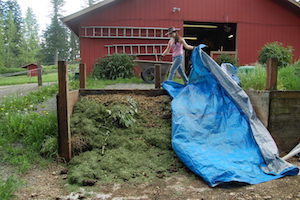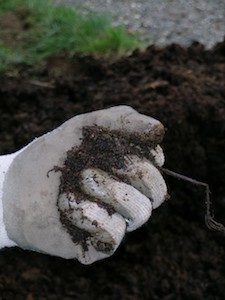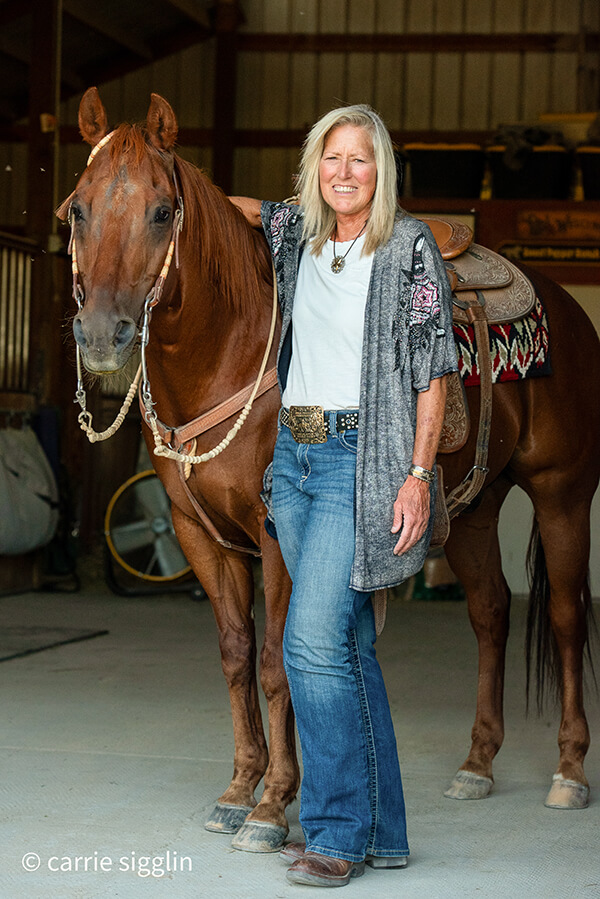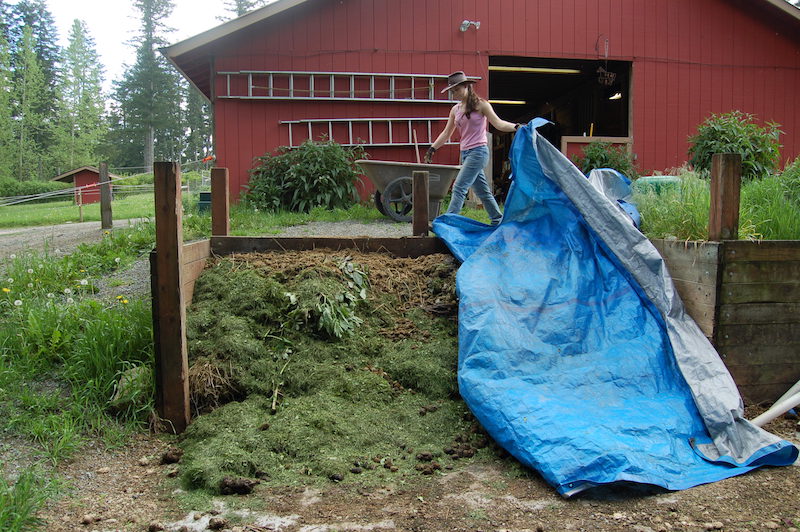Compost Should be as Wet as a Wrung-out Sponge
by Alayne Blickle, Horses for Clean Water

Previous articles of mine have covered different aspects of composting so now it’s time to step up to the compost pile and see if your compost passes the squeeze test.
Moisture is an important component to composting. The beneficial bacteria, fungi, and microorganisms that convert manure and stall waste into a humus-like substance can only do so with the right amount of water. Compost piles need to be damp but too much water will fill the pore spaces between particles, drowning the good bugs and creating an anaerobic environment with associated stinky odor issues. The optimum moisture content of a pile is between 50% and 60%. Two simple techniques can help you monitor the dampness: measuring the moisture content and covering your compost.
A high-tech moisture probe can test compost moisture content, but a quick and easy “squeeze test” is probably the simplest way to get an idea of how damp or dry your compost is. It’s as easy as it sounds: squeeze a handful of compost (wear a glove if you’d prefer) and determine the moisture content by what type of ball it forms and how much water drips out.

The manure and stall waste in your compost pile should be about as damp as a wrung-out sponge. It should be damp but not dripping with water. You should only be able to squeeze out a drop or two. There is too much moisture if water drips from the sample. If the material does not form a ball in your hand, it is too dry. Keep it damp in the summer by hosing down the manure in your wheelbarrow every day before dumping into the pile.
Covering compost keeps it from getting too wet or too dry. This can be done with a tarp, plastic sheet, or a roof. A cover of some sort prevents your compost from becoming a soggy mess in the winter and all dried out in the summer. Most importantly, covering your compost also prevents the nutrients you’re saving for the garden from being washed out of the pile and into the surface water causing other problems—for you, your neighbors, or the environment.
So, don a glove today and see if your compost passes the squeeze test!
Join Alayne Blickle at these FREE upcoming Horses for Clean Water events:
NAMPA, ID
Sweet Pepper Ranch
Sunday, October 8, 1 – 3 pm
WORKSHOP & FARM WALK: Designing Mud-free Horse Paddocks & Managing Winter Pasture $10/person or $20/household [email protected] to register or for questions.
ISSAQUAH, WA
King County Library System Building
Thursdays, October 19, 26 and November 2, 9, 6:15 pm to 9 pm
WORKSHOPS: Land & Water Stewardship for Livestock & Small Farm Owners
- Streams and Wetlands: Living with Livestock near Water. October 19 with a KingCD native plant expert
- Mud Management: Record Rainfall / Record Mud. October 26 with a Horses for Clean Water presenter
- Manure Management: Got Livestock? Got Manure! November 2 with Alayne Blickle as a presenter
- Pasture Management: Becoming a Grass Farmer. November 9 with King County Noxious Weed Program to talk about weed ID and control
FREE! Register: kingcd.eventbrite.com, (425) 282-1949 or [email protected]
REDMOND, WA
Two Horse Ranch
Sunday, October 29, 1 – 3 pm
FARM TOUR: Horses and Bear Creek
FREE! Register: kingcd.eventbrite.com, (425) 282-1949 or [email protected]
WOODINVILLE, WA
Brightwater Treatment Facility
Friday, November 3, 7 – 8:30 pm
WORKSHOP: Wipe Out Plastics in Your Every Day Life
FREE! Register: kingcd.eventbrite.com, (425) 282-1949 or [email protected]
REDMOND, WA
Meadow Ridge Farm
Saturday, November 4, 10 am – noon
FARM TOUR: Get Ready for Winter at a Mud-free Horse Property
Register: 425-282-1949 or [email protected] or kingcd.eventbrite.com
Originally Published October 2017 Issue

Alayne Blickle began in the 1990’s as a pioneer in water conservation and natural resources conservation by creating the entrepreneurial consulting business, Horses for Clean Water, an award-winning internationally acclaimed education program that looks for horse-healthy, nature-based solutions to land management challenges. She continues this work today partnering with agencies, organizations, and horse owners throughout North America and worldwide. She is a regularly contributing writer and photojournalist to several equine publications.
Alayne lives with her horse trainer husband, Matt Livengood, in southwestern Idaho where they raise and train AQHA horses and mustangs on their eco-friendly horse ranch. Contact her through the Horses for Clean Water website or through their ranch website Sweet Pepper Ranch.
For more information contact Alayne at [email protected] or 206-909-0225.






